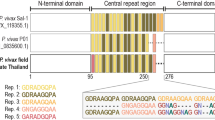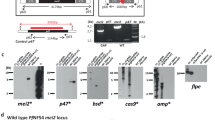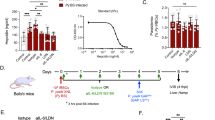Abstract
Malaria is a mosquito-borne disease that is transmitted by inoculation of the Plasmodium parasite sporozoite stage. Sporozoites invade hepatocytes1, transform into liver stages, and subsequent liver-stage development ultimately results in release of pathogenic merozoites2. Liver stages of the parasite are a prime target for malaria vaccines because they can be completely eliminated by sterilizing immune responses, thereby preventing malarial infection3. Using expression profiling, we previously identified genes that are only expressed in the pre-erythrocytic stages of the parasite4,5. Here, we show by reverse genetics that one identified gene, UIS3 (upregulated in infective sporozoites gene 3), is essential for early liver-stage development. uis3-deficient sporozoites infect hepatocytes but are unable to establish blood-stage infections in vivo, and thus do not lead to disease. Immunization with uis3-deficient sporozoites confers complete protection against infectious sporozoite challenge in a rodent malaria model. This protection is sustained and stage specific. Our findings demonstrate that a safe and effective, genetically attenuated whole-organism malaria vaccine is possible.
This is a preview of subscription content, access via your institution
Access options
Subscribe to this journal
Receive 51 print issues and online access
$199.00 per year
only $3.90 per issue
Buy this article
- Purchase on Springer Link
- Instant access to full article PDF
Prices may be subject to local taxes which are calculated during checkout


Similar content being viewed by others
References
Kappe, S. H., Kaiser, K. & Matuschewski, K. The Plasmodium sporozoite journey: a rite of passage. Trends Parasitol. 19, 135–143 (2003)
Shortt, H. E. & Garnham, P. C. C. Pre-erythrocytic stage in mammalian malaria parasites. Nature 161, 126 (1948)
Hoffman, S. L. & Doolan, D. L. Malaria vaccines-targeting infected hepatocytes. Nature Med. 6, 1218–1219 (2000)
Matuschewski, K. et al. Infectivity-associated changes in the transcriptional repertoire of the malaria parasite sporozoite stage. J. Biol. Chem. 277, 41948–41953 (2002)
Kaiser, K., Matuschewski, K., Camargo, N., Ross, J. & Kappe, S. H. Differential transcriptome profiling identifies Plasmodium genes encoding pre-erythrocytic stage-specific proteins. Mol. Microbiol. 51, 1221–1232 (2004)
Sachs, J. & Malaney, P. The economic and social burden of malaria. Nature 415, 680–685 (2002)
Hoffman, S. L. Save the children. Nature 430, 940–941 (2004)
Nussenzweig, R. S., Vanderberg, J., Most, H. & Orton, C. Protective immunity produced by the injection of X-irradiated sporozoites of Plasmodium berghei . Nature 216, 160–162 (1967)
Hoffman, S. L. et al. Protection of humans against malaria by immunization with radiation-attenuated Plasmodium falciparum sporozoites. J. Infect. Dis. 185, 1155–1164 (2002)
Gardner, M. J. et al. Genome sequence of the human malaria parasite Plasmodium falciparum . Nature 419, 498–511 (2002)
Carlton, J. M. et al. Genome sequence and comparative analysis of the model rodent malaria parasite Plasmodium yoelii yoelii . Nature 419, 512–519 (2002)
Thathy, V. & Menard, R. Gene targeting in Plasmodium berghei . Methods Mol. Med. 72, 317–331 (2002)
Sibley, L. D. Intracellular parasite invasion strategies. Science 304, 248–253 (2004)
Meis, J. F., Verhave, J. P., Jap, P. H., Sinden, R. E. & Meuwissen, J. H. Malaria parasites–discovery of the early liver form. Nature 302, 424–426 (1983)
Meis, J. F., Verhave, J. P., Jap, P. H. & Meuwissen, J. H. Transformation of sporozoites of Plasmodium berghei into exoerythrocytic forms in the liver of its mammalian host. Cell Tissue Res. 241, 353–360 (1985)
Potocnjak, P., Yoshida, N., Nussenzweig, R. S. & Nussenzweig, V. Monovalent fragments (Fab) of monoclonal antibodies to a sporozoite surface antigen (Pb44) protect mice against malarial infection. J. Exp. Med. 151, 1504–1513 (1980)
Tsuji, M. et al. Demonstration of heat-shock protein 70 in the sporozoite stage of malaria parasites. Parasitol. Res. 80, 16–21 (1994)
Renia, L. et al. Malaria sporozoite penetration. A new approach by double staining. J. Immunol. Methods 112, 201–205 (1988)
Acknowledgements
We thank A. Kunze and J. Whisler for technical assistance. This work was supported by grants from the National Institutes of Health and the Bill and Melinda Gates foundation to S.H.I.K., and the research focus ‘Tropical Medicine Heidelberg’ of the Medical Faculty of Heidelberg University and the Deutsche Forschungsgemeinschaft to K.M.
Author information
Authors and Affiliations
Corresponding authors
Ethics declarations
Competing interests
The authors declare that they have no competing financial interests.
Rights and permissions
About this article
Cite this article
Mueller, AK., Labaied, M., Kappe, S. et al. Genetically modified Plasmodium parasites as a protective experimental malaria vaccine. Nature 433, 164–167 (2005). https://doi.org/10.1038/nature03188
Received:
Accepted:
Published:
Issue Date:
DOI: https://doi.org/10.1038/nature03188
This article is cited by
-
Malaria vaccines: the 60-year journey of hope and final success—lessons learned and future prospects
Tropical Medicine and Health (2023)
-
Malaria & mRNA Vaccines: A Possible Salvation from One of the Most Relevant Infectious Diseases of the Global South
Acta Parasitologica (2023)
-
Regulation of Atg8 membrane deconjugation by cysteine proteases in the malaria parasite Plasmodium berghei
Cellular and Molecular Life Sciences (2023)
-
The first complete genome of the simian malaria parasite Plasmodium brasilianum
Scientific Reports (2022)
-
Malaria-Antigene in der Ära der mRNA-Impfstoffe
Monatsschrift Kinderheilkunde (2022)
Comments
By submitting a comment you agree to abide by our Terms and Community Guidelines. If you find something abusive or that does not comply with our terms or guidelines please flag it as inappropriate.



